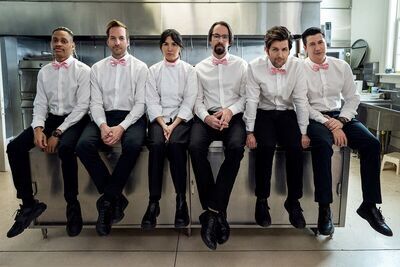
In an entertainment climate that relies on viewers’ nostalgia, the comedy revival trend has existed for quite some time. With shows like “iCarly,” “That ’90s Show,” “Night Court,” etc. making their rounds, none of them have compared to the anticipation surrounding the long-awaited resurrection of “Party Down.”
The short-lived Starz original comedy series from creators John Enbom, Rob Thomas, Dan Etheridge, and Paul Rudd about out-of-work Hollywood professionals operating as pink bowtie-wearing party caterers working various events across LA brought an original and raunchy angle to the workplace comedy formula in 2009. The chemistry of its charismatic comedic ensemble (including Ken Marino, Adam Scott, Lizzy Caplan, Ryan Hensen, Martin Starr, Jane Lynch, and Megan Mullally) hits the right balance between workplace satire and peak physical humor.
Despite its critical love and comedy scene reception, “Party Down” never found an audience, leading to an early cancellation. Several cast members, including Lynch and Scott, expanded their stardom through their roles in network comedies “Glee” and “Parks and Recreation,” respectively.
After 12 years, the majority of the original “Party Down” gang (excluding Caplan) returns to don their bowties and cater crazier events in a hilarious third season.

Jumping from the 2010s to the 2020s, the Party Down team is in new chapters of their lives. Many of them have moved on from the company. Failed actor Henry Pollard (Scott) is now a high school teacher. Egotistical actor Kyle Bradway (Hansen) finally got his big break as a movie star. Momager Lydia Dunfree (Mullally) finds success through her daughter’s (Liv Hewson, replacing Kaitlyn Dever) career, and spiritualist Constance Carmell (Lynch) is financially comfortable as a donor of the arts. Still tethered to Party Down is Ron Donald (Marino), who sets his delusional ambitions of grandeur to buy the catering company high, all while managing a younger staff … and jaded failed hard sci-fi writer Roman DeBeers (Starr). At a celebration party for actor Kyle Bradway, the gang reunites. Alas, the events of that fateful event shift the course for many of the gang to eventually return to the catering company in some form. Some of the event spaces Ron and his Party Down team take their business to include an actor’s (James Marsden) birthday party, a luau for Sting fans, and a fake prom, just to name a few.
In the five out of six episodes that were provided and screened, “Party Down” retains its signature single-set-per-episode formula with its same sharp wit in a surreal contemporary lens. Co-creator and showrunner John Enbom and his writers take full advantage of the surrealness of the current American landscape involving post-pandemic economic issues, cancel culture, and nationalist groups, and organically integrate them into the scene in “Party Down” ‘s endlessly unpredictable fashion.
The writers naturally find ways of applying previous events as the jumping-off point for several players settling into the 2020s. The most significant example is Scott’s Henry Pollard, who takes Party Down back as an additional gig outside his teaching duties to pay for an urgent matter. Other characters face major career regressions that reflect the fragility of Hollywood culture. Though most of the characters have hit their forties or even fifties, the petty comical banter, and career-obsessed pissing-contested drivel that made the kinetic energy function remain timely. Despite marketing misleading viewers to assume that every returning character was going to return to the titular company under Ron’s wing, the writers graciously allow the entire original cast to return to new positions and life chapters aligned to their character’s careers. A few other notable members who do not have to wear the pink bowtie are Lydia and Constance who pop in as socialites in most but not all episodes.
Thankfully, for a show that has suffered from dated and forced racial humor like a lot of its ’00s colleagues, the producers and writers induct much-needed diversity in Lucy (Zoë Chao)—a passionate culinary artist with shady business contacts—and Saxon (Tyrel Jackson Williams)—an inept influencer wannabe without a personality to save his life. Both charismatic newcomers stand out as individuals and fit into the show’s quirky cast, sharing fantastic chemistry with the veteran cast while letting loose. Williams particularly stands out in the latter episodes with his feats of gut-busting, unexpected physical comedy.

Also included in the series’ regular shelf is Jennifer Garner as Henry’s new love interest Evie, a superhero film producer who misses her former indie productions. The connection shared between Garner and Scott is charming thanks to their natural energy. As their relationship develops throughout the season, this successful yet tired producer finds bizarre ways to integrate herself with the team, attending some events Henry caters to, doubling those events as mini dates for the two to hang out at. At times Evie’s inclusion is forced, but Garner’s hearty grounded nature rounds out the similar, mature vibe Scott dishes.
Apart from its sharp writing, the third season gets more outrageously ambitious with its physical comedy, most at the expense of the relentlessly optimistic-yet-pathetic Ron Donald. This offers a much-deserved appreciation to actor/director Ken Marino whose commitment to Ron’s streak of hysterical failures is so unabashedly funny. One bit of physical comedy in one of the latter episodes made me laugh so hard, I was lightheaded.
A notable concern for fans is the question of how the series holds up without Lizzy Caplan’s Casey Klein. Klein and Pollard’s heated workplace romance, while well-developed, came across as the classic hot lead relationship comedy template—your Jess & Nick or Jim & Pam. Caplan’s presence is missed because Casey Klein was a relatable depiction of the struggling career-oriented underdog with peak anxiety. That said, Caplan’s absence does not devoid “Party Down” of its excellence when the entire ensemble, new and old, are all enthusiastically taking this material to new heights.
Answering the question of the in-show catchphrase, “Are we having fun yet?” with “Yes, we are,” the belated 12-year hiatus of “Party Down” was well worth the wait. Mixing the show’s character-driven wittiness and naturally infused social commentary with a newfound sense of maturity all around, this revival marks a new golden standard for giving a classic comedy new life.
Five episodes screened for review.




